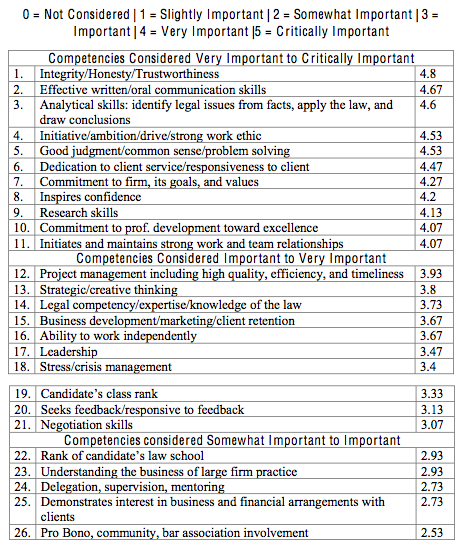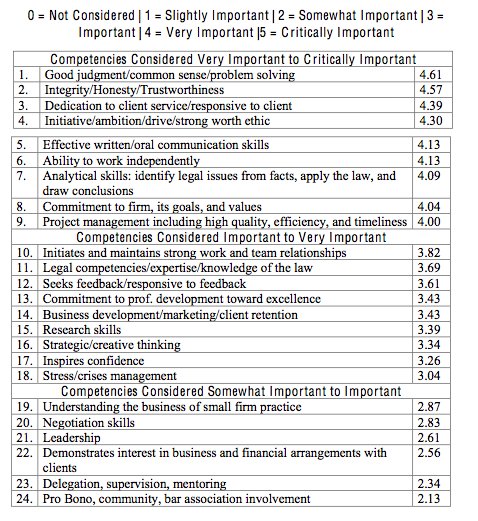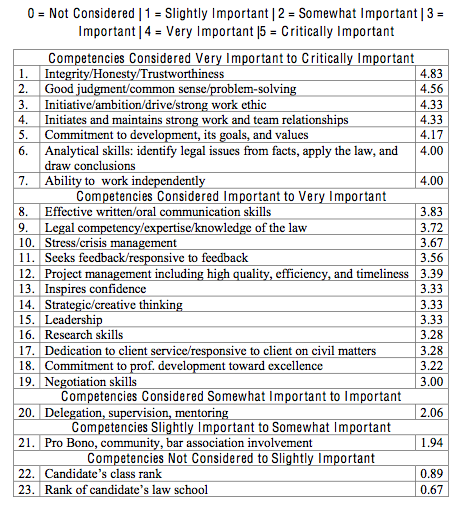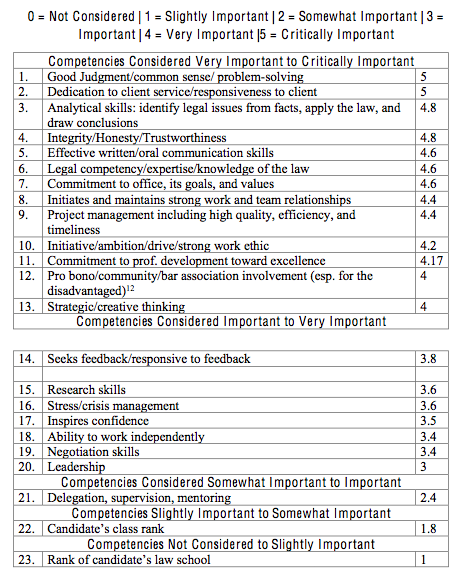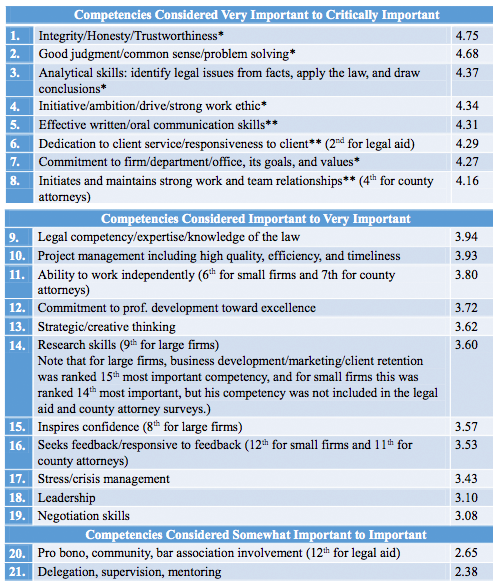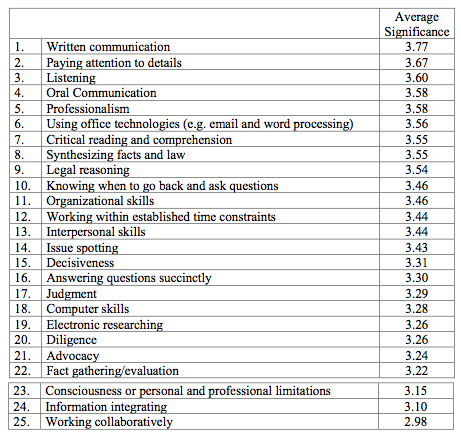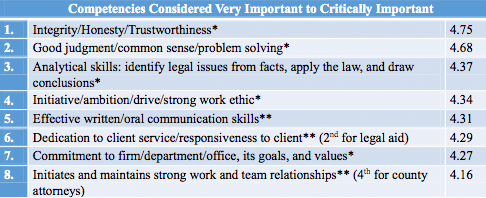This morning I saw on the Legal Skills Prof Blog that a new paper was released on SSRN by Professor Neil W. Hamilton entitled Changing Markets Create Opportunities: Emphasizing the Competencies Legal Employers Use in Hiring New Lawyers (Including Professional Formation/Professionalism). I thought it sounded interesting and gave it a read. From the abstract:
To guide legal educators and law students in responding to challenging markets both for entry-level employment and for applications to law schools, this article analyzes empirical research on the competencies that legal employers, the profession itself, and clients are looking for in a new lawyer. The article advances the proposition that law schools can build on an existing strength of helping each student develop knowledge of doctrinal law, legal analysis, legal research, legal writing and oral advocacy to do better at helping each student develop additional important competencies (and have evidence of those competencies) that legal employers, the profession, and clients and value, particularly the professional formation (professionalism) competencies.
The article also helps each student understand the importance of developing transferable skills (or competencies) that equip the student to respond over a career to changing markets for legal services. An overall theme for both legal educators and law students is to view these changing markets as opportunities to grow in new directions and thus to differentiate from competitors.
Translation: I surveyed a bunch of lawyers and asked them what they were looking for when hiring new associates. I also looked at surveys other people did on the same topic. This paper goes over what I found.
I’m going to list out all of the survey data first, then offer brief commentary at the end.
Here are the results of Hamilton’s surveys:
Survey of 14 Largest Firms In Minnesota
Survey of 23 Smalls Firms (2-9 lawyers) in Minnesota
Survey of 18 County Attorneys in Minnesota
Survey of Legal Aid Offices In Minnesota
Average Ratings Across All Four Above Surveys
National Conference of Bar Examiners Survey of New Lawyers with 1-3 Years Experience
The survey asked what skills, abilities, and knowledge domains are significant to the newly licensed lawyer. On a scale from “1” as “minimally significant” to “4” as “extremely significant.”
So this is what new lawyers think they need, which is different from what employers want.
Federation of Law Societies of Canada Survey of New Lawyers
[Asked new lawyers to]…rate both the frequency with which each lawyer performed or used a competency and the lawyer’s perception of the severity of the consequences if the lawyer did not possess each competency.
2013 Harvard Law School Survey of 124 Attorneys at Large Law Firms
Respondents also rated the importance for associates of a list of seven knowledge bases and skills (with “1” being “not at all useful” and “5” being “extremely useful”).
Essential Skills For New Lawyers
Just to save you the trouble from having to scroll back up, here is the average of Hamilton’s surveys again:
What’s interesting to me about this list is that only two competencies are really “Hard” law school skills:
- Analytical ability
- Effective written/oral communication skills
You can learn the following skills over time if you join a firm that helps its associates develop as lawyers:
- Dedication to clients
- Commitment to values
- Builds strong team relationships
But #1, #2, and #4 are just flat out you-have-it-or-you-don’t:
- Integrity
- Good judgement
- Initiative
Which is not to dissimilar to the report from Educating Tomorrow’s Lawyer at IAALS. When firms hire new lawyers they’re often looking for more intangible factors, not if you were on law review.
- So is it really a wonder that so many practicing lawyers repeatedly talk about ethics?
- Big firm partners advocate for the same things.
- Judges and lawyers with over twenty years of experience all said the same thing when asked what is necessary to succeed as a new lawyer – integrity and relationships.
It really always comes back around to the simple question:
“Is this a trustworthy individual?”.
It’s a hard thing to quantify and probably doesn’t show up well on a resume. It’s a gut-check feeling that people make when they meet you.
Just as clients want to know they can trust a lawyer when they retain them, firms want to know that they can trust the new lawyers they hire.
There’s no law school class for that.
Hamilton, Neil W., Changing Markets Create Opportunities: Emphasizing the Competencies Legal Employers Use in Hiring New Lawyers (Including Professional Formation/Professionalism) (2014).
South Carolina Law Review, Vol. 65, 2014, Forthcoming; U of St. Thomas (Minnesota) Legal Studies Research Paper No. 14-13.
Available at SSRN: http://ssrn.com/abstract=2412324


